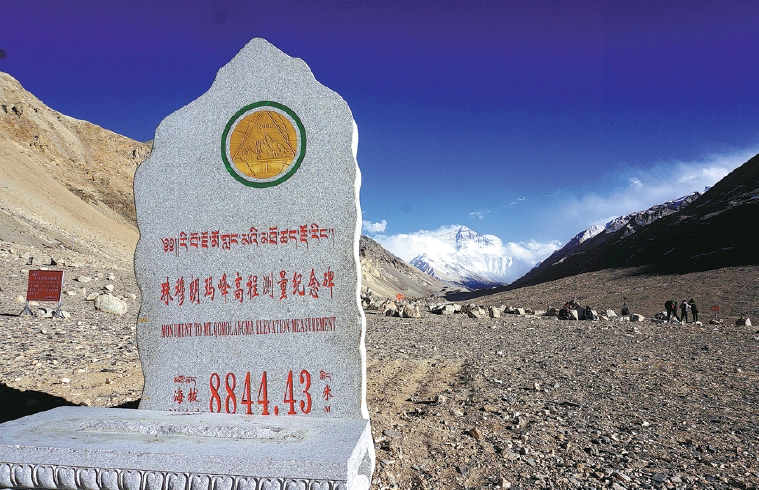Visions in the stream

A stone tablet marks the summit of Mount Qomolangma at 8844.43 meters above sea level. [Photo provided to China Daily]
Chinese travel website Mafengwo says it has recently organized over 10,000 livestreams by travel influencers, agencies and retailers from home and abroad since March. Views increased by 96 percent in May compared with April, and the viewing times increased by 180 percent over April.
"Livestreaming is a new direction for tourism marketing and can be a sustainable business in the industry," says Mafengwo's vice-president, Zheng Xun.
"Video-travel tips are like an upgrade of visitors' demands for travel content, and livestreams are a necessary part. It takes time for customers to decide whether or not to buy a tourism product. So, you need quality livestream content to promote your products."
He says the livestreams offer detailed travel tips. They cover a range of topics like the location of parking lots and how to order local dishes, and viewers can ask questions whenever they like.
"Livestreaming is more direct and true in representing travel experiences," he says.
"You can retouch and edit photos to make them perfect. But during a livestream, viewers watch everything that happens during your trip, such as the scenery outside the car window and some small accidents."
He says the website assists hosts to produce livestreams with good content in ways like helping them pitch topics and design interactions with netizens. For example, a hostess may help netizens seek divine guidance by drawing lots in a Japanese temple.
Feng says it's better to visit the Rongpo Monastery from June to September due to weather. Netizens want to know what to prepare if they plan to visit, like warm down coats, portable oxygen and sunblock.
She suggests travelers check the risk levels of where they're from since Tibet has different measures for visitors from different regions.
Feng says local tourism is recovering gradually. Prices are much lower than normal, and the scenery is at its best with fewer visitors.
"It's best to learn about the culture and lifestyle when you visit a new place. Our customized itinerary includes taking guests to observe people making traditional Tibetan incense and painting thangka (traditional Tibetan Buddhist scroll paintings)."
Feng also livestreamed at the Potala Palace when it reopened in early June and other celebrated scenic areas in Lhasa.
He Lu, product manager at Lijiang United Holiday Travel Agency in Lijiang city, Yunnan province, and her colleagues also started to livestream local scenic spots, such as the Yulong Snow Mountains, at the end of April. The company chooses themes that appeal to visitors, such as boutique bed-and-breakfasts, delicious food and cultural heritage.
"People are most interested in the number of visitors to the scenic area and whether it's convenient to travel there," she says.
"Many are still taking a wait-and-see approach to travel plans. Several fans won free trips to the snowcaps through our livestream. But we haven't yet had such winners from other provinces."
She believes tourists enjoy livestreams because they satisfy inner needs.
Only a few people are actually traveling, due to safety concerns. Those who are waiting can use livestreams to choose their destinations.
"It's the right move for traditional travel agencies like us to use livestreaming, which has become a national topic. At first, it is essential to draw people interested in visiting Yunnan," she says.
"Popular spots were often overcrowded. But there are fewer tourists since the pandemic."
When Lijiang Old Town's bars were closed, their regular singers sat on the streets, playing instruments, singing and selling drinks.
Some tourists would sit and sing with them.
And local volunteers watered flowers and grass, and cleaned the cobblestone streets.
She says the agency's popular products are short trips to areas surrounding Lijiang, especially for independent travelers, some of whom are from other provinces. The minibus is meticulously disinfected and visitor numbers are capped at half of capacity. Travelers also undergo temperature and health QR-code checks.
"Customized domestic trips are faring comparatively well since people who've had to give up international trips have higher budgets and requirements," she says.
"Some families may prefer tailored groups rather than traveling with a larger group of strangers during the outbreak."